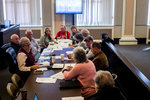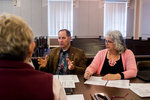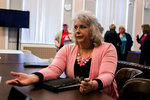




A quarterly meeting on Tuesday between members of the Lewis County Seniors nonprofit organization and members of the Lewis County Board of County Commissioners was primarily focused on efforts to increase alternative funding avenues for the community centers.
The BOCC has previously stated their intent to cut off all funding to the senior centers in order to help eliminate a deficit in the county budget. However, when the senior centers said that they would be forced to shut down operations without funding the BOCC relented with a one-time allotment of $100,000 to the senior centers in order to help cover costs in 2018.
For 2018, the senior centers are operating on a budget of $525,798, which includes $352,117 for nutrition programs and $173,681 for enrichment activities.
It is likely that the senior centers will ask for funding from the county again in 2019 but the organization has also been undertaking several efforts intended to help bridge that funding gap internally. In February the senior group opened a thrift store in downtown Centralia called as A Second Time Around Thrift Store. Additionally, efforts are still underway to obtain liquor licenses for the senior centers so that they can host parties, receptions and other events, as well as regular bingo nights.
According to Glenda Forga, executive director of the senior center organization, things have been going swimmingly at A Second Time Around since it opened at 749 S. Market Boulevard. She noted that the store recently brought in $1,300 in sales on one particularly busy day, and sales have been on an upward trend as staffing and display issues are gradually ironed out.
“Everytime you try to go in that store it’s packed and all the staff is running around like chickens with their heads cut off,” said Forga, who noted that the store has been receiving a windfall of quality donations from the community recently. “It’s not your grandma’s thrift store. It’s more of a boutique and we are trying to spread the word about that.”
Forga said she is hopeful that the senior center thrift store can generate upward of $20,000 per month in order to generate revenue to help pay for nutrition and enrichment programs at the senior centers. Senior Board member, Ron Averill, noted that the thrift shop has $219,000 in overhead costs annually, which equals $18,250 per month. That means $30,000 in monthly sales would generate roughly $141,000 in funds each year that could be folded back into senior center operations. However, if sales slipped to just $20,000 per month, yearly revenue generated by the thrift store would fall to just $21,000.
In order to generate additional funds the seniors’ organization has been working to obtain the licenses required to serve liquor and host bingo nights at the senior centers. The senior board envisions a world where they generate revenue through once-a-week bingo nights and by renting out the centers for special events like wedding receptions.
“When we do that it will be a source in order to bring in the community, in particular in those rural out-of-town areas,“ Averill told the BOCC on Tuesday. “I want to tell you that not all of the seniors are happy about the liquor license, so we have told them that, ‘Hey listen, you don’t have to do this as a fundraiser. It’s up to you.’”
Forga said that she believes the bingo nights would begin in the Twin Cities and then gradually spread throughout the county so that each senior center would bust out the numbered ping pong balls and colored daubers once a week. She said the senior board estimates that those bingo nights and specialty events could bring in a total of about $5,000 per month toward the overall revenue goal.
“The thing is we are not looking at serving hard liquor. We are only looking at beer, so if somebody wants to have a beer while they play bingo, they can do that,” explained Forga. “We don’t want the impression out there that we are going to have liquor available 24/7. No, it’s going to be targeted toward specific events, and to the general public, not just the seniors.”
She added that in Cowlitz County the senior organization has developed their own catering services in order to generate additional funds while simultaneously meeting the state requirement to serve food alongside alcohol.
Forga and Averill said that the seniors organization has also been making headway on their operational costs thanks to increased donations from the public. In particular, they noted that the organization upped their suggested donation this year from a $3 to $5 sliding scale per meal. Forga said the actual donations received typically average out to between about $1.40 and $2.50 per meal but donations this year have thus far totaled nearly 106 percent of the anticipated revenue.
“I am so proud of our seniors for that because they are really stepping up and donating,” said Forga.
Forga said that due to the considerable efforts of the senior board, volunteers and the community at large, operations have largely gone uninterrupted at the senior centers during the first quarter of this transitory year. She noted that the Morton center has added two enrichment classes, the Twin Cities center has added a class, Packwood had added an exercise program for the first time in at least five years and Winlock has added new classes, including a painting class while doubling the size of its nutritional program recently.
“Our primary concern was have you noticed any changes. Is your staff still there and when you walk through the door is everything the same,” said Forga. “The doors are still open and they are still getting their meals, which is what everyone has been concerned about.”
As part of her report to the BOCC, Forga added, “I think overall (the transition) is going pretty well. We did have a few little hiccups here and there that I think you guys are used to.”
Averill noted that while the senior centers are currently operating in the black there are some expenses that are backlogged and will catch up with the senior center operations by the end of the year.
Averill added that while operations are currently in flux at the senior centers, the very nature of the senior centers seems to be shifting for good.
“What we are finding is that people are coming to senior centers later and later in life,” said Averill. “The new generations are working longer, and are better able to manage on their own longer.”